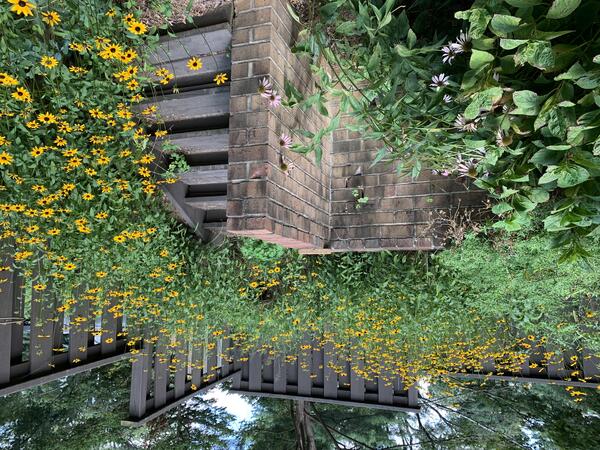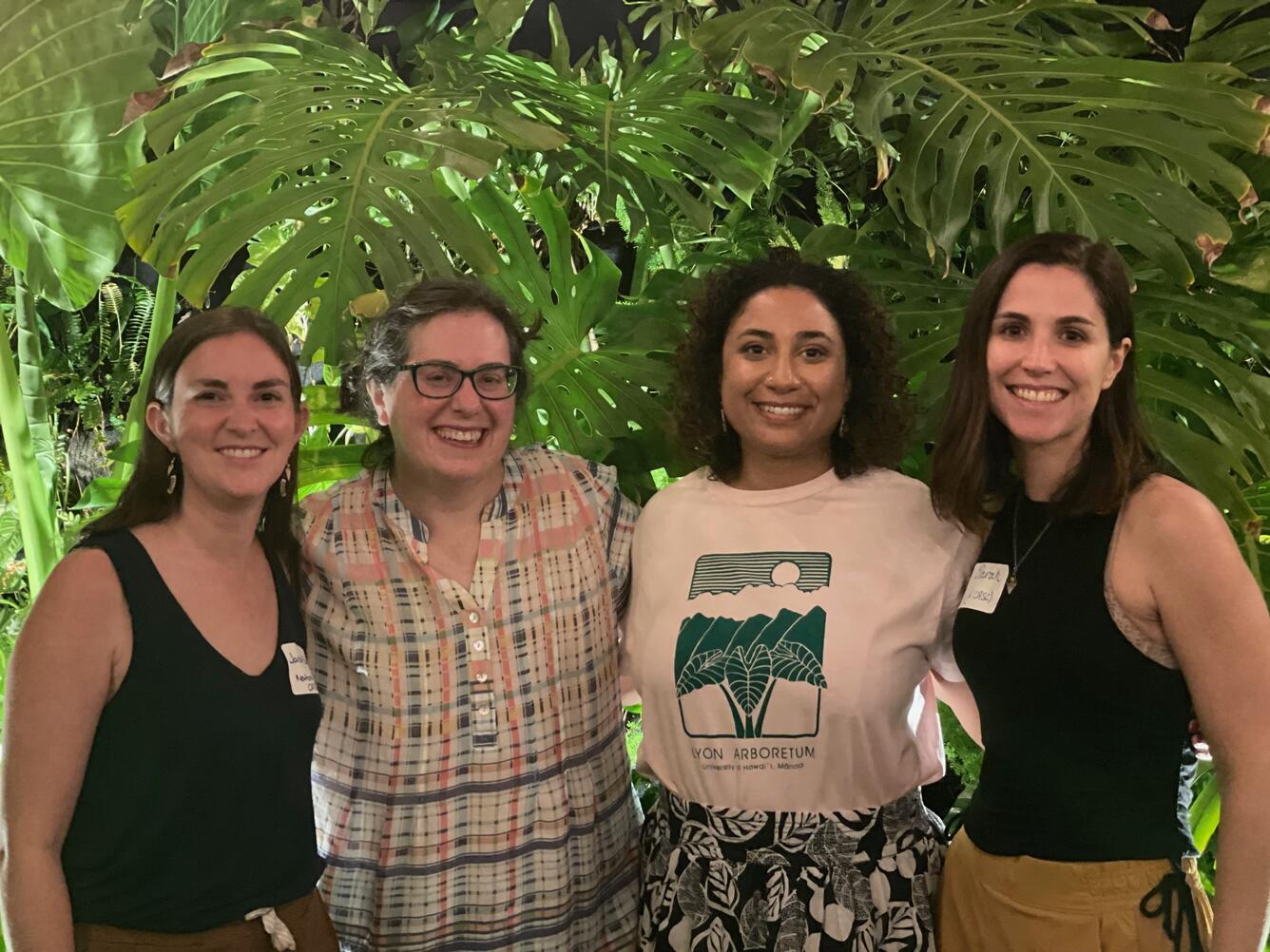Saying Goodbye to Emily Fort, CASC Deputy Senior Administrator
As CASC Deputy Senior Administrator Emily Fort prepares for her next chapter, we reflect on her long and accomplished career with the CASC network.
"It's difficult to fully appreciate everything that Emily has done for the CASC program since its beginning. She is the first person many approach to bounce ideas off of and to ask for help navigating so much of what makes the CASCs actually function. Over the past 10 years, she's served in roles as a supervisor, mentor, colleague, and confidant ... and that's just for me. I truly wish her the best with the next steps in her life."
- Ryan Boyles, Senior Scientist, CASC Climate Adaptation Technical Support
Emily Fort has spent her whole life at the intersection of science, society, and the environment. Growing up in the shadow of Oak Ridge National Laboratory and the Y-12 National Security Complex in eastern Tennessee, physics and math had tangible impacts on her community. Irradiated lakes outside of town and regular controversies surrounding local nuclear waste disposal made even esoteric subjects feel very, very relevant to everyday life.
“I always loved science, and I’ve always been especially aware of how important it is to be able to explain why science matters and how it impacts people,” she says.
In her 15-year career with the USGS Climate Adaptation Science Centers (CASCs), Emily has played a critical role in shaping how the network manages and talks about its science. First as the Communications, Data, and Information Technology Coordinator for the National CASC and now as the program’s Deputy Senior Administrator, Emily has done everything from establishing the CASCs’ data management policies to creating the network’s first websites and newsletters. As she prepares for her next chapter, we look back on her accomplished career and key role in shaping the CASC network we know today.
From the Ground Up
“That question of ‘Why does this matter?’ has really been the connecting thread through my circuitous career.”
Building on a background of physics and public policy, Emily found her way into the federal government fairly early in her career. After five years with a private government consulting firm, Emily joined the National Science Foundation in 2004 as a Program Analyst developing data and budget information systems.
“I enjoy working on the challenging, complicated problems the government deals with and trying to help,” she says. “I also find a lot of satisfaction focusing on the good of the American people.”
Loving the work but struggling with the “all day long coding on a computer by myself,” she moved to the Office of Management and Budget and eventually to the brand-new Department of the Interior National Climate Change and Wildlife Science Center (NCCWSC), which would later become the USGS National CASC.
Emily was thrilled to find a federal position in an applied science agency. But she had a big task in front her in the early days of data management with the CASCs.
“In the beginning, there was no system to track data management plans or to centrally manage and review proposals. Everybody just got everything via email,” she shares. “I was basically like, ‘This is not working for me.’ We needed to create a system that we could all use.”
That was easier said than done. A critical piece of the CASC experiment was partnering closely with host and consortium institutions to fund science and support regional needs. But individual organizations have their own processes and systems, and many didn’t have access to internal USGS file sharing. The fledgling program also did not have the budget for or access to commercial tools for organizing information and engaging with the public.
Undeterred, Emily and her team set about building the technical foundation of the CASC network. They partnered with offices like the USGS Fort Collins Science Center to integrate into existing data systems and build the network’s first website, and found open-source tools to fill gaps as needed.
The CASCs’ infrastructure and capacity have grown over time, in large part because of Emily’s willingness to invest in creative solutions and staff development.
“It is because of Emily that the CASCs can do what they do,” says Steph McAfee, Regional Administrator of the Southwest CASC. “She has designed and re-designed processes to improve our program and solved problems nimbly and graciously.”
Reflecting on her supervisory umbrella, which has grown from just data management to include project tracking, internal and external communications, budget and admin, and IT, Emily is grateful for the trust she has been given over the years by leadership.
“The great thing and the reason I think I've been here so long is that I’ve been granted the flexibility to really grow my position and add on things that I'm interested in,” she says. “It was really rewarding to be on the ground floor of something and be able to envision where you want to go and then how you're going to piece it together.
“It was a lot of seizing opportunities to learn and not being afraid of not knowing, of not being an ‘expert.’”
Blooming in a New Season
Despite her long tenure with the USGS, Emily admits she is not as outdoorsy as many would expect.
“I joke that I'm an indoor kitty,” she says. “Going out and tromping through the woods, that was never me. I’ve always just wanted to sit and read all day.”
But having learned so much about human and climate change impacts on the environment, she has found herself becoming much more conservation minded.
“It’s really educated me personally,” she says. “I’ve changed a lot of what I buy, and it’s really sparked an interest in native plants and gardening. That’s one way being with the CASC network has really benefited me.”
As she looks forward to more time in her pollinator garden and with her small army of pet and foster cats, CASC staff reflect on all Emily has done for the network over the years.
“Emily has been the heart and soul of the program, quietly solving daily problems with strategy, creativity, endless generosity, and a smile,” says Olivia LeDee, Regional Administrator of the Midwest CASC.
Shawn Carter, Chief Scientist of the National CASC, agrees. “Emily has left her imprint on almost every aspect of our program,” he says. “She has shaped our processes, our products, and our people. Her legacy will always remain in the great program and people she helped foster.”
For many on her direct team, Emily was their onramp into the workplace and their champion as they grew from early career into accomplished professionals. Like her supervisor did for her, Emily gave her staff the flexibility to expand their skill sets and take advantage of professional development opportunities.
"Emily's supervision and leadership have been a model of how trust, authenticity, and compassion can create a foundation for a welcoming team culture,” says Mia Wavrek, Program Scientist with the National CASC. “By trusting my abilities and helping me grow as a researcher and project manager, she really opened the path to my career in Federal service.”
Doug Beard, Senior Administrator for the National CASC and Emily’s supervisor for the past 15 years, sums up the tremendous impact Emily has had on the network: "Emily knows everything about the network. Her tireless efforts have allowed us to achieve things we could have never envisioned, and her talents have made a huge difference in our success."
From all of us in the CASC network, we wish you the best moving forward, Emily!






